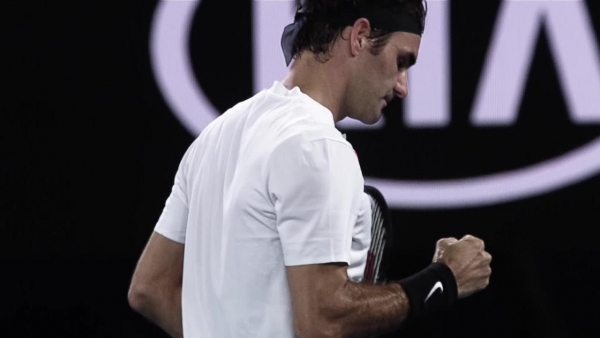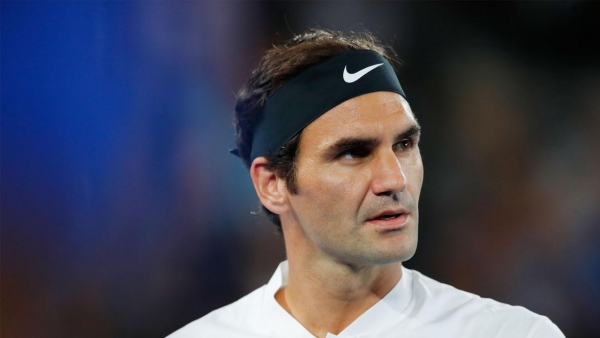Much has changed since a 22-year-old Roger Federer defeated Marat Safin for his first Australian Open title in 2004.
The court was green, his hair was pony-tailed, and while Safin has long since retired from professional tennis – although not without at last claiming an Australian Open title in his third final the following year – the 36-year-old Federer has remained on tour with wife Mirka and his four children in tow.
What hasn’t changed, of course, is Federer’s jaw-dropping natural talent, along with his ability to translate it into history-making feats. With that first Australian Open victory, the Swiss also debuted at world No.1 – a position he’s held, in total, for a record 302 weeks.
And now comes the chance for yet more tennis history, as Federer faces Marin Cilic on Sunday night for the opportunity to claim his 20th Grand Slam title at AO2018.
“Twenty times special. I don’t know what to tell you. It would be amazing,” said the world No.2, noting everything required to progress to another milestone match.
With a fifth title memorably achieved in a sixth Melbourne final against Rafael Nadal in 2017, a seventh Australian Open final is itself unmatched – as are Federer’s 30 Grand Slam finals overall.
“It isn’t just an easy trip to the finals. There's always a lot of work that goes into it during the tournament, focus, and also preparation beforehand,” the defending champion noted. “This is something you sort of plan from a long time ago. That's why when it does happen, it's a great feeling. Rewards the hard work in my team.”
It also rewards the hard work of many years. The fifth-oldest Grand Slam finalist of the Open era, Federer, at age 36 and 173 days, is also the oldest man to reach an Australian Open final since Ken Rosewall (age 37 and 62 days) defeated Mal Anderson (age 36 and 306 days) in 1972.
And within those records are even more for the superstar; contesting his 72nd Grand Slam, the most of any male player, he’s also set to play an unparalleled 107th Australian Open match.
It’s natural to wonder about contrasts between tournaments, with one reporter enquiring about how things have changed in the past 10 years. “You go through different stages throughout your career,” Federer responded. “I’m happy I’m still around still healthy, still playing good, give myself chances, playing the best.”
And the best is what the Swiss could well face against Cilic, the first Croatian player, male or female, to reach the final of this event.
That fact alone will add inspiration for the 29-year-old, who was the US Open champion in 2014. He was also runner-up to Federer at Wimbledon 2017, when he was hobbled by blisters and reduced to tears in a straight-sets loss.
“In one way, I had to experience as one amazing experience in a final and one not so,” said Cilic, comparing his contrasting experience of Grand Slam deciders.
“It's big motivation for me to play that final and obviously to win, and I'm feeling really good with my game, and so hopefully I can have a great match and also great energy on the court.”
Energy will be an important factor in the 2018 men’s final, given the players’ contrasting journeys to the championship match.
Federer has progressed through every round in straight sets, creating the potential to win a third Grand Slam title – matching his feats at Australian Open 2007 and Wimbledon 2017– without the loss of a set.
For Cilic, there were sets dropped to Vasek Pospisil in the first round, Pablo Carreno Busta in the fourth and Rafael Nadal in the quarterfinal. He’s spent 17 hours and three minutes on court at this tournament, while Federer has advanced to the final in 10 hours and 50 minutes.
Other numbers, too, favour the Swiss – most notably, the 8-1 head-to-head record he holds over Cilic, including five matches on hard court and their three most recent meetings.
But the world No.6 Cilic will remember his one standout match. In the semifinals of the 2014 US Open, he defeated Federer in straight sets and went on to become only the second Croatian man to win a Grand Slam title.
Federer notes it was a transformative event. “Him winning the US Open, like Stan (Wawrinka) winning here a few years ago, it gave them great belief they can do it. If the big moments come about, that they can attain this level,” he said.
“On the court, he's a winner. You can see it on the way he behaves on the court. He's there to win and not just to be there … I think he strives for more.”
It’s impossible to know whether “more” for the Croat will mean a first Australian Open title, or a sixth for the Swiss. The only guarantee is the quality – and history – that those high stakes will create.

